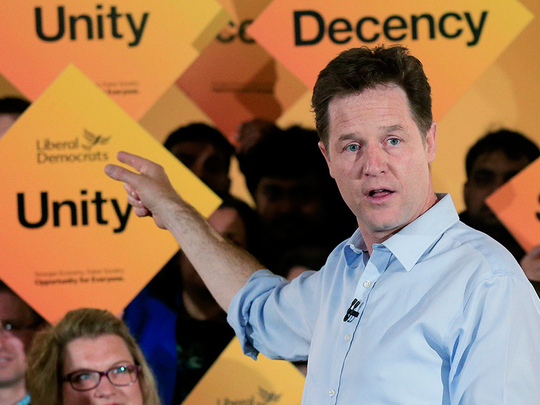
LONDON: Britain's deputy prime minister and leader of the centrist Liberal Democrat party Nick Clegg is fighting to retain his seat in parliament and save his political career in a general election this week.
Support for the Liberal Democrats has plummeted since the party won almost one in four votes in the 2010 election, putting them in government for the first time since 1945 as the junior coalition partner of the centre-right Conservatives.
Shortly before the agreement with Prime Minister David Cameron was forged, German Chancellor Angela Merkel is said to have remarked to him "The little party always gets smashed!"
That may prove true for the Liberal Democrats, who now how have roughly eight percent support according to opinion polls, and for their leader Clegg.
A multilingual former Eurocrat, Clegg is fighting a close battle to retain his parliamentary seat in Sheffield Hallam in northern England, where an April poll showed the Labour candidate narrowly ahead.
About a third of the party's 57 seats across Britain are under threat in Thursday's election.
But with no party expected to win a majority in the May 7 vote, the remaining Liberal Democrats may still be needed to prop up a government led by either the Conservatives or their rivals, the centre-left Labour party of Ed Miliband.
Clegg, 48, has indicated he will speak first to whichever party wins the most seats and has vowed to anchor the next government to the centre ground by tempering Conservative cuts and Labour borrowing.
"If you don't want to run the risk of our country lurching to the right, lurching to the left, the only way to guarantee to keep our country on track is to vote Liberal Democrat," Clegg said in a rallying campaign speech at a cricket club in southern England.
He has announced that health spending, an increase in funding for education and a salary raise for public sector workers are "red lines" in any coalition talks.
Broken promise
Traditionally Britain's third party, the Liberal Democrats have been damaged by the rise of alternatives such as the Green party, the anti-immigration UK Independence Party and the Scottish National Party.
They were accused of selling out by forming a coalition with the Conservatives and their attempt to reform Britain's voting system fell flat.
But the act that most heavily damaged Clegg's reputation was his breaking of a pledge not to raise university tuition fees, made as he courted the student vote before the election.
Tens of thousands of students protested against the rise of maximum tuition fees to #9,000 (12,600 euros, $13,400) a year, in demonstrations that turned violent in London.
But Clegg and a majority of Liberal Democrat MPs voted in favour, and the bill narrowly passed in December 2010.
Dogged by the issue, Clegg tried to put it behind him in a video apology in 2012 - mercilessly remixed into a song by YouTube comedians in a clip that went viral.
Oliver Coppard, Labour's candidate for the Sheffield Hallam seat, has made much of the broken promise in his campaign, accusing Clegg of abandoning his principles and neglecting his rural constituency.
Nevertheless the Liberal Democrats have forged a reputation as fearsome on-the-ground campaigners and have won tight races in the past.
Return to Brussels?
Clegg has said that he wants to remain the Liberal Democrat leader "in all circumstances" after the election.
But some British media have questioned whether in the event of an election defeat he might return to Brussels, where he worked at the European Commission for five years in the 1990s.
Born in Buckinghamshire in south-east England to a Dutch mother and a half-Russian father, Clegg speaks English, Dutch, French, Spanish and German.
He studied at the University of Cambridge as well as in the United States and Belgium, and has three sons with his wife, Spanish lawyer Miriam Gonzalez Durantez.
He began his career in journalism, working briefly for the Financial Times in Hungary in 1993 before taking up the European Commission post and later becoming an advisor to the then Conservative trade commissioner Leon Brittan.
Clegg was elected to the European Parliament as a Liberal Democrat in 1999, became an MP in 2005, and became leader of the party two years later.












